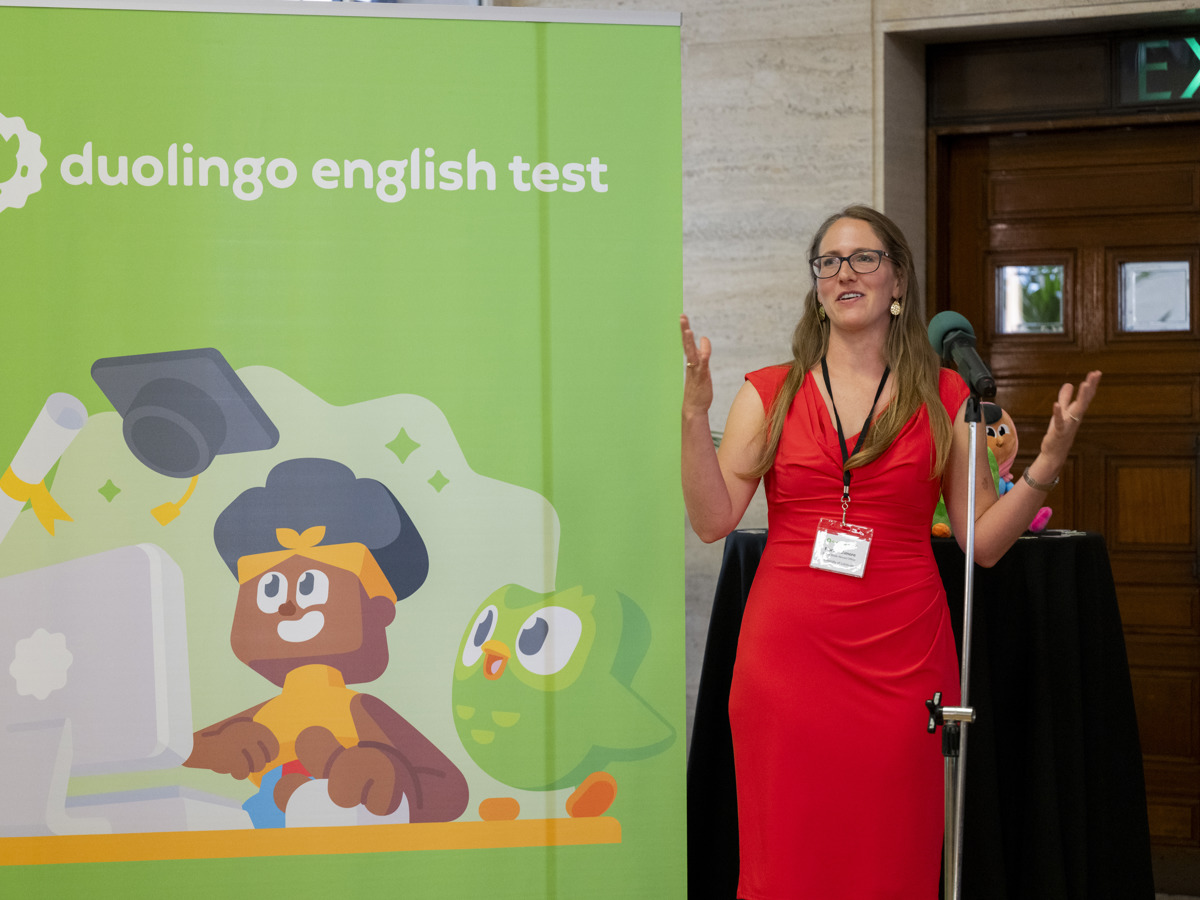

This blog is from our UKCISA Annual conference 2025 sponsor, Duolingo English Test and written by Dr. Fiona Ashmore from the University of Leicester
A few weeks ago, I found myself in an unusual position: taking a high-stakes English language test. This wasn't for a visa application, but as part of the inaugural Duolingo English Test University Challenge. The task was simple: take the same DET my international students take, and possibly win £5,000 prize money for my university or a designated charity.
To my surprise, I won. I was presented with my prize by Laura Kaub, Director of Duolingo’s University Access Programme at DETcon in London, and I donated the prize to the University of Leicester’s Sanctuary Seekers Unit.
But the experience left me with more than just a sense of accomplishment; it gave me a real insight into the pressures our applicants face and challenged my preconceptions about the role of AI in assessment. It was a powerful exercise in bridging the gap between real life policies and the lived experience of our students.
This experience is particularly relevant given the current scrutiny of English language requirements. As a recent HEPI blog post highlighted, the English language proficiency of international students is once again under the microscope, with most commentators and policymakers having never taken a high-stakes English language test themselves. The blog, "English language requirements under the microscope: Do you have what it takes to meet your university's English language entry requirements for international students?", questions whether university staff could pass the same tests their international students face, and raises important questions about the accessibility and fairness of these tests, especially for those in countries without test centres.
From Policy to Practice: Why I Took the Challenge
As a Senior Study Abroad Officer, my work is embedded in the world of international education, and while my team may not always be the ones setting specific admissions requirements, we are linked to the colleagues who do. We advise students, build partnerships, and manage the processes that depend on these entry scores. But, how many of us have experienced the assessments we mandate? Michael Lynas at Duolingo described the challenge's aim as helping staff "experience the assessment process their students undertake." This resonated with me. We operate in a sector that, in the words of the UKCISA’s #WeAreInternational Student Charter, should be “working towards the provision of the highest level of international student experience and support”. This student-led charter, developed with input from across the sector, provides a framework for creating a welcoming, inclusive, and equitable environment for international students. It is a call to action for all of us in the international education sector to do better.
My experience with the test convinced me of the need for a different approach. As I reflected afterwards, it’s vital that we "expose ourselves to AI and become part of it rather than sort of rejecting it fully." We cannot afford to be dismissive of new technologies just because they contain the term 'AI'. We must engage, understand, and critique them from a position of knowledge, not apprehension. By taking a test like this, we do more than just build empathy for our students. We equip ourselves to make better, more informed decisions. We can assess whether a tool is genuinely useful, fair, and accessible. We can see how AI can be harnessed to break down barriers, such as for the displaced students our Sanctuary Seekers Unit supports, who may not be able to access a physical test centre. These initiatives are invaluable in contributing to the UN’s Sustainable Development Goal 4: Quality Education.

The Experience: Surprisingly Challenging
Until that day, I didn’t fully understand the mechanics of the Duolingo English Test. The reality was far more challenging than I had anticipated. The test itself was a fast-paced, integrated assessment that relentlessly tests different skills. It didn't just passively test my knowledge; it demanded active production of language under significant time pressure, from describing images to participating in a simulated video conversation.
Even as a native English speaker, I found it incredibly demanding. The cognitive load of switching between reading, writing, speaking, and listening in quick succession was intense. It served as a potent reminder of the hurdles that applicants, many of whom are non-native speakers operating under immense stress, must overcome. It’s one thing to see a score on an application; it’s another to feel the adrenaline of the clock counting down as you try to articulate a coherent thought. Any preconceptions I had about this being a 'simpler' option were quickly dispelled.
I encourage colleagues across the sector in admissions, recruitment, and academic departments to take the test. The experience will provide invaluable food for thought. It will challenge your assumptions, deepen your empathy for the applicants behind the applications, and give you a more nuanced perspective on the tools that are shaping the future of international education. It’s an opportunity not just to see what our students see, but to better understand the changing world we all operate in, and to truly embrace the principles of the #WeAreInternational Student Charter, creating an environment where international students feel welcomed and supported from their first point of contact to graduation and beyond.
If you would like to try taking the Duolingo English Test for yourself, you can request a demo coupon at institutional@duolingo.com


